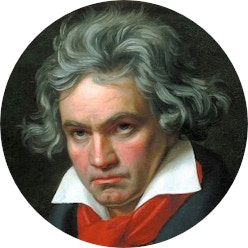About
Людвиг ван Бетховен, известный во всем мире благодаря Гимну радости из его девятой симфонии, является одним из величайших композиторов в истории музыки. Несмотря на то, что его ранние годы прошли в бедности и страданиях с отцом-пьяницей, Бетховен получил солидное музыкальное образование, особенно в Вене у Гайдна и Сальери.
Блестящий пианист и великий импровизатор, Лист горячо восхищался композитором, чьи работы он разделил на два различных периода: «один, где традиционная форма все еще доминирует в его мыслях, и другой, где его мысль определяет, воссоздает и формирует форму». Уже в 1798 году Людвиг ван Бетховен понял, что его способности уменьшаются, так как появились первые признаки глухоты, что привело его к попытке самоубийства в 1802 году. Однако энергия и горячее желание любить победили его, и композитор использовал свое время для сочинения, оставив человечеству шедевры, которые возникли из света тишины. Работы Бетховена стремятся к общению и надежде и восхваляют красоты мира.
Наследие Людвига ван Бетховена
Одинокий гигант и мизантроп, работы Людвига ван Бетховена продлили баланс классицизма и открыли бездны романтизма. Он смог создать новый музыкальный язык, между традицией и современностью. Рене Лейбовиц упоминал, «композитор величайшего вдохновения, и более того, музыкант, измученный видимой одержимостью идеалом формы и структуры, постоянно доводимой до самых пределов того, что человеческий разум способен постичь, понять и сформировать». Его влияние определило Листа, Гектора Берлиоза, Роберта Шумана и Иоганнеса Брамса, которые его почитали.
Key moments in Ludwig van Beethoven's life
1770
Born in Bonn, second child of Maria Magdalena (née Keverich) and Johann van Beethoven.
Several generations of musical background.
Mozart premieres Mitridate re di ponto.

Beethoven's house of birth, Bonn
1774
First music education by his father Johann, tenor and music teacher, who, inspired by the memory of the Mozart siblings’ success story as travelling prodigies, tries to follow in their steps and prepares a tour where he presents Beethoven as being younger, in order to further fit the narrative of a child prodigy à la Handel-Haydn-Mozart.
1778
First public concert in Bonn, Germany (“Various keyboard concertos and trios”), but doesn't establish himself as a child prodigy.
1781
Stops formal education at elementary school in order to go on tour in The Netherlands. The tour is appreciated but not the expected success.
Johann, alcoholic, unable to properly manage the education and upbringing of Beethoven, ultimately places him under the musical instruction of composer and court organist Christian Gottlob Neefe.
Neefe introduces Beethoven to Bach’s Well-Tempered Clavier.
Beethoven on Neefe:
"I thank you for the advice that you have very often given me about how to make progress in my divine art. Should I ever become a great man, you too will have a share in my success."
1782
First published work "9 Variations for the keyboard on a march by Dressler.”
1783
First printed notice of Beethoven, by Neefe: “Youthful genius… would surely become a second Wolfgang Amadeus Mozart if he were to continue as he has begun.”
Publishes first three piano sonatas “Three Piano Sonatas, WoO 47” dedicated to Maximilian Friedrich, Prince-Elector of Cologne
1787
First trip to Vienna, sponsored by Count Ferdinand Ernst Gabriel von Waldstein, introduced by Neefe, with the intention of meeting with Mozart and studying with him.
Meeting with Mozart is positive but ultimately unsuccessful.
Returns to Bonn to visit his mother, who dies during the summer.
Death of Leopold Mozart.
Death of Gluck.
Mozart premieres Don Giovanni in Prague.
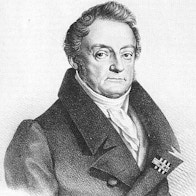
Count Waldstein
1792
French troops invade the Rhineland one month before Beethoven moves to Vienna to study with Haydn under the patronage of Count Waldstein who famously wished “You shall receive Mozart’s spirit from Haydn’s hands.”
Also studies counterpoint with Albrechtsberger and Italian vocal style with Salieri.
Johan van Beethoven dies in December.
Birth of Rossini.
Haydn premieres Symphony No. 94 “Surprise”

French troops in 19th century Vienna
1794
Haydn leaves Vienna for London (second trip), without Beethoven.
Beethoven moves in with Prince Lichnowsky, to whom he dedicates his first published work with an opus number “Three piano trios, op. 1” (1795).
1795
Premieres first two concertos for piano and orchestra: Piano Concerto in B-flat (published in 1800 as No. 2, with opus number 19) and Piano Concerto in C (published in 1800 as No. 1, with opus number 15).
These were composed with the intention of creating a name for himself in Vienna as a virtuoso pianist and composer; they are very similar to Mozart’s late concertos, both in structure and style, particularly Piano Concerto No. 26 also known as “Coronation concerto”.
1796
Publication of first piano sonatas with an opus number “Three piano sonatas, op. 2”, dedicated to Haydn.
1797
Publication of “Two cello sonatas, op. 5” after having met French cellist Jean-Pierre Duport the previous year.
Birth of Donizetti.
Premiere of Cherubini’s Médée.
1799
Publication of Piano Sonata No. 8 in C minor, Op. 13 “Pathétique”, dedicated to Prince Lichnowsky. One of the most beloved and popular pieces for piano, since its premiere. It is striking both because of the dramatic mood linked to the tonality and the ingenious thematic recalls throughout its three movements. Beethoven seems to have used Mozart’s sonata in the same tonality, No. 14, as a main source of inspiration.
1800
Beethoven premieres the Septet in E-flat major for winds and strings, op. 20 and Symphony No.1 in C major op. 21 at the same concert in Vienna’s Burgtheater, with one of the attendees, none other than the Holy Roman Emperor Francis II, reportedly saying “There is something revolutionary in that music!.” Both works are heavily influenced by Mozart and Haydn’s own serenades and symphonies, on which he expands. Their popularity during Beethoven’s lifetime allowed him to also introduce and market himself as a forward-looking symphonic composer.
1802
Publishes Piano Sonata No. 14 in C sharp Minor, op. 27 No. 2, "Moonlight", dedicated to pupil Countess Giulietta Guicciardi. Beethoven titled both sonatas present in op. 27 Sonata quasi una fantasia ("sonata in the manner of a fantasy") which explains, especially regarding Moonlight, the innovative trajectory of the work, in three movements and with only the last one being truly fast. In spite of this novelty that rejects the conventional movement arrangement of the sonata form in the Classical period, the work was popular during Beethoven’s lifetime and continues to be one of the most known and beloved sonatas by the composer.
1803
Premieres Symphony No. 2 in D major, op. 36 and Piano Concerto No. 3 in C minor, op. 37 with himself at the piano. The symphony, although of classical tradition, hints at the later characteristic “heroic” style of the composer with its fiery allegro and a scherzo taking the place of the traditional minuet. The concerto, reminiscent of Mozart’s 24th in the same tonality, is a virtuoso show-piece brimming with gravitas.
The Sonata for Violin and Piano No. 9 in A Major, op. 47 "Kreutzer Sonata" has a successful public premiere in Vienna (published later in 1805), with Beethoven at the piano and the original dedicatee, British violinist George Bridgetower on the violin. After a dispute, Beethoven decided to change the dedication to French violinist Rodolphe Kreutzer, considered the greatest at the time, and to whom we owe the colloquial name of the work "Kreutzer Sonata". Curiously, the violin virtuoso never played the sonata which he considered "outrageously unintelligible". The sonata has an unusual length and is indeed one of the most demanding and virtuosic ever published, for both technical and emotional reasons. Moreover, the work makes a daring statement regarding the concept of democracy in chamber music, with a first movement that begins with a soft-spoken declamatory instrumental symmetry that represents equality.
Birth of Berlioz.
1804
Completes Piano Sonata No. 21 in C Major, op. 53 "Waldstein", dedicated to Count Waldstein. It surpasses all previous sonatas in its scope and technical difficulty, with an elaborate figuration, original pedal effects, astonishing use of trills and overall pianistic virtuosity.
1805
Premiere of Symphony No. 3 in E-flat major, op. 55 “Eroica” and Fidelio (German opera).
Fidelio is the only opera composed by Beethoven and a German-language favorite, it is Mozartian in style and highly dramatic in its moral theme and symphonic scope. It tells the story of Leonore who goes to great lengths to rescue her unjustly imprisoned husband. Beethoven wrote no less than 5 overtures for the work. This grand Beethovenian overture is one of the precursors of the symphonic poem.
The Eroica symphony, considered a grand example of the aesthetic transition from Classicism to Romanticism, is of great importance in the history of music for a multitude of reasons. It is longer than the previous two and also longer than any symphony by Haydn or Mozart. The emotional range is grand and varied, all within a military subject matter. Perhaps the most controversial and famous aspect of this paramount composition is the intention behind its creation and the original dedication. Beethoven gave the work a title “Bonaparte”, for he admired the life and deeds of Napoléon Bonaparte, the First Consul who in his eyes embodied the democratic ideals of the French Revolution. He withdrew the dedication in a fit of rage and disappointment when he learned that Bonaparte had declared himself Emperor. The work was ultimately published in Italian with the title "Heroic Symphony, composed to celebrate the memory of a great man."

Bonaparte at the Pont d'Arcole by Gros
1806
Composes Three String Quartets op. 59 “Razumovsky” after receiving a commission from the Russian Ambassador in Vienna, Count Andreas Razumovsky.
Beethoven is still attached to the 4-movement tradition for quartets, but greatly expands their musical content, technical difficulty and especially their emotional range. Highly esteemed today, they left their original public astonished and the interpreters upset because of the novelty and difficulty.
The least negative critique they received when publicly premiered said:
"Three new, very long and difficult Beethoven string quartets … are attracting the attention of all connoisseurs. The conception is profound and the construction excellent, but they are not easily comprehended."
Premieres Violin concerto in D major, op. 61, unsuccessfully. It immediately fell into obscurity until it was revived in 1844 by Mendelssohn conducting the London Philharmonic Society, with 12-year-old violin prodigy Joseph Joachim as soloist. It is now one of the best known and most regularly performed violin concertos.
1807
Publishes Piano Sonata No. 23 in F minor, op. 57 “Appassionata” dedicated to Count Franz von Brunswick. One of the greatest, most iconic and technically challenging piano sonatas in the whole repertoire, it is also a beloved piece by performers and public alike. The colloquial nickname refers to the intense agitated character of the work, and does find its origin in the autograph manuscript which says "La Passionata" on the cover. Beethoven’s unpaid secretary Anton Schindler once asked the composer the meaning behind the sonata, and the famous answer he got was: “Read Shakespeare’s The Tempest!.”
1808
Premieres Concerto for Violin, Cello, and Piano in C major, op. 56, “Triple Concerto” (published in 1804).
Premieres Symphony No. 5 in C minor, op. 67 and Symphony No.6 in F major, op. 68 along Piano Concerto No. 4 in G major, op. 58 and the Fantasy for Piano, Choir and Orchestra in C minor, op. 80, "Choral Fantasy".
The Triple Concerto, a novel show-piece, premiered in a summer concert and was well received, especially in regards to the two string soloists, who have the most virtuoso, pyrotechnic writing. The later marathon concert (which lasted over 4 hours) saw the public premieres of four masterpieces and is in itself an iconic moment in the history of music. It took place during winter in the famous Theater an der Wien and wasn’t a success for several reasons, including the cold temperature inside the theater and a lack of preparation by the orchestra.
The Fifth symphony with its iconic four-note initial motif, often called the “fate” motif, further expands on the heroic subject matter of the Third. Romantic German author E.T.A Hoffmann wrote a very poetic essay titled “Beethoven’s instrumental music” which included a highly dramatic positive review of the symphony (“indescribably profound, magnificent symphony”). This greatly participated in the development of the Beethoven myth: an unavoidable romantic narrative of struggle and transcendence that presents Beethoven as a morally superior introspective individual with a character as strong as his music, and whose music is solely the expression of feelings of pain and suffering…
The Sixth symphony is a formidable example of a program symphony, with specific and explicit extra-musical inspiration. Here Beethoven brilliantly gives his varied impressions of nature a symphonic expression.
The Forth piano concerto was favorably received after its public premiere, but curiously fell into obscurity until it was revived by Felix Mendelssohn in 1836. It is considered today to be one of the best in the whole repertoire and it is also one of the most performed globally. Here, Beethoven not only expands the limits of the classical piano concerto form, with a complex dialogue between the piano and the orchestra, but also introduces one particular innovation: for the first time, the piano soloist starts the work and introduces the main theme of the first movement without the orchestra. It is known to be Martha Argerich’s favorite piano concerto.

Forte Piano by Jakob Pfister, Würzburg
1811
Public premiere of Piano Concerto No. 5 in E-flat Major, Op. 73 "Emperor", dedicated to Archduke Rudolf, patron, friend and pupil of Beethoven. Unlike the previous concerto, Beethoven was unable to perform his own work at the premiere, because of his encroaching deafness. The concerto, in the same tonality as the Eroica symphony, is a pinnacle of Beethoven’s pianistic virtuosity, with a majestic character and an abundance of rhythmic figures evocative of the military style.
Birth of Franz Liszt.
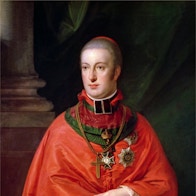
Rudolf von Österreich by Johann Baptist von Lampi
1812
Beethoven meets Goethe, while at the Bohemian town of Teplitz where he went a second time for a cure at the spa, as advised by his doctor. The impression of the polymath and poet on the composer is immortalized in correspondence: "His talent amazed me; unfortunately he is an utterly untamed personality, who is not altogether wrong in holding the world to be detestable, but surely does not make it any more enjoyable ... by his attitude."
1813
Premiere of Symphony No. 7 in A Major, op. 92, at a charity concert in Vienna, with Beethoven conducting. Composed while he was in Teplitz and dedicated to Count Moritz von Fries, patron of the arts, its premiere was a public success and Beethoven himself was quite pleased with it. The now famous second movement Allegretto had to be encored immediately after performed, for the audience was filled with rapture and demanded it. It is a staple work in the symphonic repertoire and one of the most performed Beethoven symphonies, after the 5th and the 9th. Composer Richard Wagner is one of its admirers in the 19th century and famously called it the "apotheosis of dance", thanks to the astonishing use of rhythmic devices evocative of dance.
Birth of Richard Wagner.
1814
Premiere of Symphony No. 8 in F Major, op. 93 in Vienna, less than three months after the premiere of the 7th, with Beethoven conducting still. It is, unlike many of his works, without dedication. Also appreciated by Wagner, it is written in a manner highly reminiscent of Haydn and Mozart. This aspect makes it often pale in comparison to the surrounding 7th and 9th, the more “heroic” 3rd and 5th and the larger and more descriptive 6th (in the same tonality). Since Beethoven was effectively bringing forth a transformation of the symphonic tradition of the sublime and the digni?ed towards the monumental and the dramatic, the more lighthearted 8th seems peculiar. However, the factors of wit and surprise taken into consideration explain both the nod to Haydn as much as the work’s own deserving place in Beethoven’s output. While Beethoven did fondly refer to it as "my little Symphony in F", he also considered the 8th to be much better than the 7th.
1815
Last public appearance as pianist.
1816
Publishes Sonata for Violin and Piano No. 10 in G Major, op. 96, dedicated to Archduke Rudolf, who played the piano part at the public premiere in 1813, with French violinist Pierre Rode. The last sonata composed by Beethoven for piano and violin, it is a charming and seemingly innocent forward-looking chamber music piece, with an elusive language and intimate musical texture. It is also peculiar in that it questions the general idea of Beethoven’s “three periods”, for it displays different aspects of the arbitrary boundary between the middle and late period. Beethoven himself refused to adhere to this concept during his lifetime and his musical output in itself proves the superficiality of the categorization (with a possible exception regarding the string quartets), it is only after his death that early biographers and music publishers constructed and popularized the narrative of three periods.
Rossini premieres The Barber of Seville in Rome.
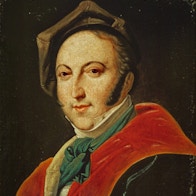
Rossini
1817
Publication and premiere of Piano Sonata No. 28 in A Major, op. 101, dedicated to pianist Baroness Dorothea Ertmann. Ertmann was one of the first pianists who became known specifically for her interpretations of Beethoven. This sonata, a highly intimate work, is the first of the last 5 piano sonatas of Beethoven and the very first time he used the German name for the pianoforte in the title Hammerklavier. These late works for the piano solo are of the most technically and psychologically challenging of the whole repertoire.
Rossini premieres La Cenerentola in Rome.
1819
Publishes Piano Sonata No. 29 in B-flat Major, op. 106, "Hammerklavier", Beethoven's most difficult piano work and the only of the late sonatas to revisit the four-movement plan characteristic of the earlier sonatas.
Beethoven described it as “a sonata that will keep pianists busy when it is played 50 years hence”– an accurate prediction, since apart from Franz Liszt, Clara Wieck-Schumann and Hans von Bülow, few pianists tackled the immense musical, intellectual and psychological challenges of this great sonata before the last decades of the nineteenth century.
Birth of Jacques Offenbach, Clara Wieck-Schumann and Franz von Suppé.
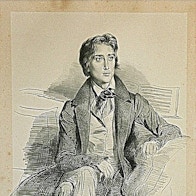
Franz Liszt
1822
Meets Rossini and Franz Schubert in Vienna.
Publishes the cantata Meeresstille und glückliche Fahrt op. 112 on Goethe’s poem and sends a copy of it with a letter to the poet;
“The admiration, the love and esteem which already in my youth I cherished for the one and only immortal Goethe have persisted.”
Goethe does not reply.
Prince Nikolaus Galitzin from St. Petersburg commissions three string quartets.
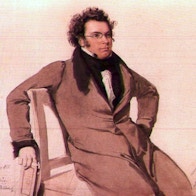
Franz Schubert by Wilhelm August Rieder
1823
Publishes 33 Variations in C Major on a Waltz by Diabelli, op. 120, Beethoven's greatest variations set and a pinnacle of pianistic virtuosity, praised by Hans von Bülow as a “microcosm of Beethoven’s genius” and by Alfred Brendel as “the greatest of all piano works.”
Meets with Liszt.
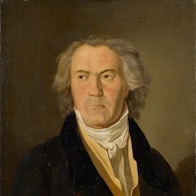
Beethoven by Ferdinand Georg Waldmuller
1824
Premieres Missa Solemnis, op. 123, dedicated to Archduke Rudolf of Austria, it is considered one of Beethoven's supreme symphonic achievements.
Beethoven on Missa Solemnis:
"my primary goal in composing this grand Mass was to awaken and permanently instill religious feelings in both the singers and listeners."
Premieres Symphony No. 9 in D Minor, op. 125, dedicated to the King of Prussia, Frederick William III. It is a choral symphony with text adapted from Schiller's poem Ode to Joy and the first example of a major composer using voices in a symphony. Admired all over the world and widely considered Beethoven's greatest work, it is also one of the most known and performed symphonies. It made an influence in many composers of the late Romantic period and continues to inspire artists and audiences today.
Birth of Anton Bruckner, Bedrich Smetana.
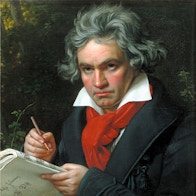
Beethoven by Joseph Karl Stieler
1826
Suffers continuous worseing illnesses. Works on the last string quartets and canons.
Death of Carl Maria von Weber.
1827
Publication of String Quartets opp. 131, 132, 135, and Grosse Fuge op. 133.
26 march: Death of Beethoven at the age of 56.
29 march: large public funeral service in Vienna, with Franz Schubert among the torchbearers.
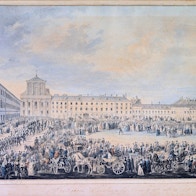
Beethoven's funeral


